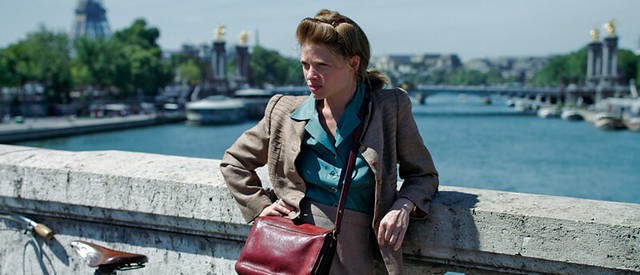
French director Emmanuel Finkiel takes on semi-autobiographical book, La douleur by writer & film director Marguerite Duras. It's an ambitious project to tackle, since Duras is a key figure in Nouveau Roman, one of the most significant French literary movements in the 20th century. She scripted Alain Resnais' Hiroshima mon amour and saw several of her books adapted for the screen. She also directed many films including Natalie Granger, India Song and Drive, She Said.
Skillfully directed and beautifully acted, Memoir of War retains much of Duras' enigmatic, complex human tendencies during war time. Like her other works, it draws from her experiences and amplifies/embelishes many of her major themes - desire, suffering, shame, survivor's guilt, memories....
The film starts with Marguerite (Mélanie Thierry) in German occupied Paris at the tip end of WWII. She had found her own journal which is essentially the book the film is based on, but she doesn't recall if it was she who wrote it. She is waiting for her husband Robert's return. He has been in German custody for his resistance activities. Robert's prolonged absence has been a disorienting, unraveling experience for her.
We roll back to 1944, just before the scale tipped for the Allied forces. Marguerite was approached by Rabier (Benoit Magimel, with a hefty gait, becoming more and more like young Gerard Depardieu these days), a collaborator, working for the Vichy regime, offering help to find where Robert is. He is a working class bloke who dreams of opening up a bookstore and thus fancies Margueritte because she's a writer. Her circle of friends in the resistance first think it's too dangerous for her, then admit that it might be a good opportunity for her to play Rabier to get important information.
First, fear and intimidation grip her but she plays along as Rabier leads her on to the promise of Robert's well being. It is clear that he wants something in return - ratting on her resistance friends. A dangerous game of cat and mouse play out.
La douleur (The Pain) which the film is based on was published much later in Duras' career as a writer. But it was supposedly from her diary she kept from the war. This was long before she established herself as a formidable writer. Yet, we see the same theme of eroticism and shame associated with many of her later works. Even though it's subtly done in Memoir of War, you notice the shame Marguerite feels as she was attracted to Rabier the traitor.
And not unlike Duras scripted Hiroshima mon amour, A Memoir of War concerns the effect of war has on people- the guilt that survivors have to carry around weighs so heavily on them that they lose their sense of self. Marguerite often sees her surroundings in a third person perspective. She also sees herself from a distance as if she is experiencing an out of body experience.
Duras doesn't put blames on a collaborator alone. Holocaust happened. As a human being, we all have to wrestle with the fact that it happened. Using shallow depth of field, Finkel makes sure there that there is a distance between people at all times. There is a striking scene of empty Paris just before its liberation where Marguerite rides her bicycle. But she will never be free from that survivor's guilt. And it won't stop even if she has Robert back finally.
Thierry is a revelation as Marguerite, a learned, intellectual woman who slowly gets broken emotionally. She proves that she is much more than just a pretty face. The film signals the arrival of another major French star actress. Memoir of War is a great film.
No comments:
Post a Comment